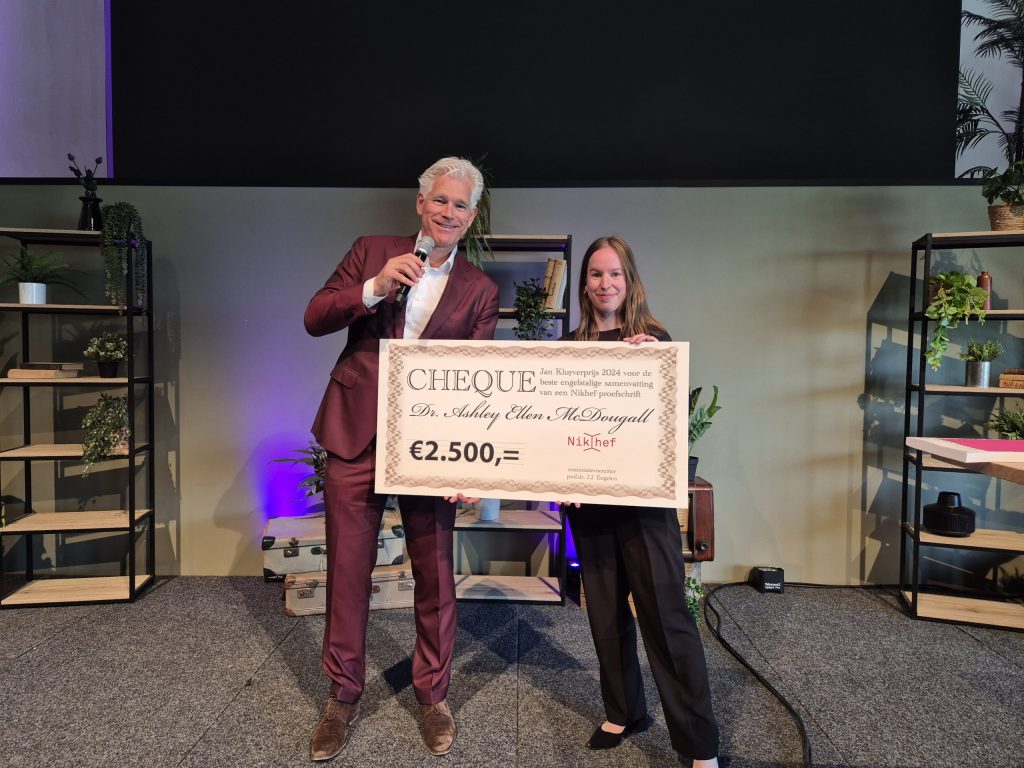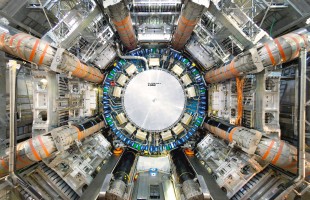Australian-born physicist Ashley McDougall has won the annual Jan Kluyver Prize for her thesis on her Nikhef research of the Higgs particle.

This was announced on Monday at Nikhef’s Jamboree this week in Nijmegen. The Kluyver Prize is awarded each year for the best English language summary of a thesis on Nikhef research. The jury consists of former directors of the particle institute and is a cash prize of 2,500 euros.
McDougall received her PhD in November 2024 for a thesis on the so-called width of the Higgs particle, using measurements from the ATLAS detector.
Precision measurements
The existence of the Higgs particle was discovered in 2012 at CERN by ATLAS and the competing CMS experiment in collisions at the LHC accelerator. Since then, physicists have been making precision measurements to better understand the particle.
Her summary, she says, was not a special project. ‘It was a matter of getting into the flow. Much of what I wanted to say, I had said before when trying to explain to friends and family what I am actually doing so far from home. At school I already loved English literature, maybe you taste that a bit.’
That her supervisor Ivo van Vulpen became professor of public understanding of science in Leiden at the time was a nice bonus. ‘I wrote the story, but Ivo gave some tips and did the Dutch translation. By the way, he was involved mainly as a particle physicist, of course.’
Crystal-clear and lighthearted
McDougall begins the summary of her thesis in her native country. ‘If you look at the sky on a clear night in Melbourne, you can see the stars of the Southern Cross shimmering between Alpha Centauri and the Southern Pleiades’, she writes.
What follows is a crystal-clear and lighthearted explanation of particle physics, of the importance in physics of the Higgs width and of the new methods to measure that quantity.
The Higgs particle manifests itself as a peak in the measurement data at a mass of 125 GeV. The width of the peak is partly due to inevitable measurement errors, but it also tells us something about the particle’s lifetime. The shorter the lifetime, the sharper the peak. In theory, that adds about 4 MeV to the width.
Extremely unstable
Higgs bosons are extremely unstable with decay times of less than 10-17 seconds. They can only be observed indirectly by looking at the particles in which the Higgs decays. McDougall studied processes in which a Higgs particle decays into two photons, and from this estimated a width of up to 220 MeV.
That’s an upper limit, which is still pretty far above the theoretical value, McDougall says. “But it’s the best we can say with the current data. For a sharper determination, the future high-intensity LHC is indispensable.’
The Higgs width is not really a high-profile analysis in particle physics at the moment, she acknowledges. ‘But precisely by choosing a topic outside the mainstream, you can make a real difference. We worked on it with two people, myself and my postdoc. Very pleasant. I personally find that much more satisfying than the huge groups on other subjects.’
Corona pandemic
Her research was not really easy, also because, as an Australian by birth, she arrived in Europe just when the corona pandemic broke out and institutions and whole societies went on lockdown. ‘An unpleasant time, but fortunately Nikhef was very involved and helpful.’
Today, McDougall works as a postdoc at Oxford University, where she is collaborating on an experiment with muons at the Paul Scherrer Institute in Zurich. She is co-building this Mu3e detector.
Ashley McDougall is determined to find a career in physics. Her ultimate goal in doing so is to return to Australia. ‘I would love to boost physics in my native country. To make a mark there, too. And also somewhat closer to my family.’
She puts the prize money from the Kluyver Prize safely in a savings account. ‘Australia is very far away and travelling is expensive. It will definitely come in handy there.’
More information about the Jan Kluyver prize: https://www.nikhef.nl/en/activities/phd/the-jan-kluyver-prize/
Ashley McDougall’s thesis: https://www.nikhef.nl/pub/services/biblio/theses_pdf/thesis_A_E_McDougall.pdf

